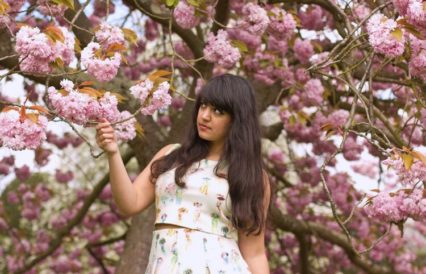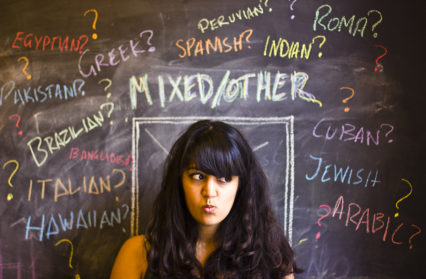Wales Arts Review celebrates the publication day of a memoir by Laila Woozeer, Not Quite White, with a short extract recounting Laila’s experience grappling with their national identity while growing up mixed race in rural North Wales.
We didn’t have a family motto, but we did have two ringing catchphrases that people chanted at us wherever we went: Where are you from? and How do you spell that? The latter was easy, I heard my mum and dad perform the spelling down the phone and out in public* several times a day, like it was our own personal radio jingle. But the first question was a mystery. Where were we from? It was easy enough to think of myself as Welsh: I belonged here in the gardens and the woods, among the trees and stars. Technically, I knew Mum had dual British and US citizenship, and that she was born in Uganda and grew up moving around East Africa, but it was easier to think of her as a one-dimensional thing: American. Everyone knew America**; America was cool – Hollywood and hamburgers, corndogs and Clintons, Sunny Delight and Saved by the Bell. Mum had the accent and the passport; she made American-style pancakes (thick, with butter and maple syrup) and American-style cookies (large, with huge chunks of chocolate, legendary at school bake sales). She called break time ‘recess’, rubbish ‘trash’, and the cellar the ‘basement’; oh boy, she was American alright, neat-o, gee whizz! Besides, everyone else saw her as American. People asked, ‘Is your mum American?’ And I’d go, ‘Yep!’ And they’d happily reply, ‘Yeah, I guessed from the voice!’ Like, case closed, nice and easy! I never mentioned her schooling in Nigeria or Mum’s rogue Scottish parent, because that didn’t fit in with ‘America’. It was easier to just go along with what people wanted to think.

Dad, on the other hand, was from Mauritius: somewhere nobody knew anything about, least of all me, and so Dad was the properly foreign parent: dark skin, weird name, unplaceable accent and unknowable country. Mum was just American: familiar, less of a threat. Dad spoke another language and ate different foods that weren’t easily available. If you wanted American cuisine, you just went to McDonald’s. Aside from being raised on a diet of largely American culture, my house held a collection of Mum’s old American school textbooks, which I would pore over, familiarising myself with their stateside quirks: kids in grades, measurements in pounds and ounces, music in half and quarter notes. My relatives in the US (aunts and great-aunts) regularly sent gifts featuring what I thought of as ‘American’ situations: stickers of raccoons and beavers, cards printed with Thanksgiving scenes, and books like Little House on the Prairie and the American Girl series*. I knew nothing of general British history – we lacked feasible plucky heroines – but the Welsh myths we learned at school sat side by side with images of log cabins and horses of the American Wild West in my head; my two threads of known history. This neatly discounted my dad from the proceedings because I didn’t understand where he was from; but he wasn’t around much anyway, so that was that.
Aside from the deluge of American-based news, films and TV, there was a magnet on the fridge that said ‘Oregon’, which, according to Mum, was the specific place where her family were. You could learn a lot from a magnet. It was green, with a pattern of trees and mountains. I’d asked why, and Mum had said, ‘That’s what Oregon is like. Forests and mountains and huge trees.’ I asked more and received accordingly: Oregon had deer and moose, and beavers and groundhogs, and chipmunks – you know, like Chip and Dale! Somewhere in my mind, I pictured Mum in this context: watched her walking through a dense forest (for some reason she was dressed in brown and wear- ing a raccoon hat) and heard the wind whistling through the leaves and the frantic scuffle of a chipmunk dashing through a tree (did they dash up trees or was that just squirrels?); saw her suddenly turn at a cracking sound from something larger moving in the woods – a stalking coyote or maybe a moose, antlers rustling the boughs, or a grizzly bear stealthily crossing a ridge. I didn’t describe this scene to my mum, and it wasn’t rooted to anything she said – it just occurred in my head – yet I filed it away under ‘Mum’s childhood’ and ‘America’ without any corroboration and referred back to it for years. Either way, it was a magnet more than I had for Mauritius.
Mostly, I felt Welsh. I knew Wales, felt Welsh in some way: surrounded by verdant Welsh valleys and more myths than mountains. I learned Welsh culture and Welsh songs and even he actual Welsh language at school. In my room, I had a felt daffodil from last year’s St David’s Day, a Cymru flag we’d made at school and a handcrafted Welsh Dragon bookmark – y Ddraig Goch – that Mum got me when I sang at the Llangollen Eisteddfod*. Though my accent was different to those of my parents, it was the same sing-songy vaguely northern/vaguely Welsh accent as everyone else around me, peppered with ‘oh aye’ and ‘fair do’s’ – proper Wrexham, like. I knew the world around me and it was familiar and safe; I had a sense of place here, a sense of belonging. Even though we weren’t actually Welsh and just lived here, it didn’t matter to me, because it was home.
Not Quite White by Laila Woozeer (£16.99, Simon & Schuster) is out now and is available for pre-order via Amazon.
Laila Woozeer is a writer, musician and performer from North Wales. To learn more about her and her work visit her website.











